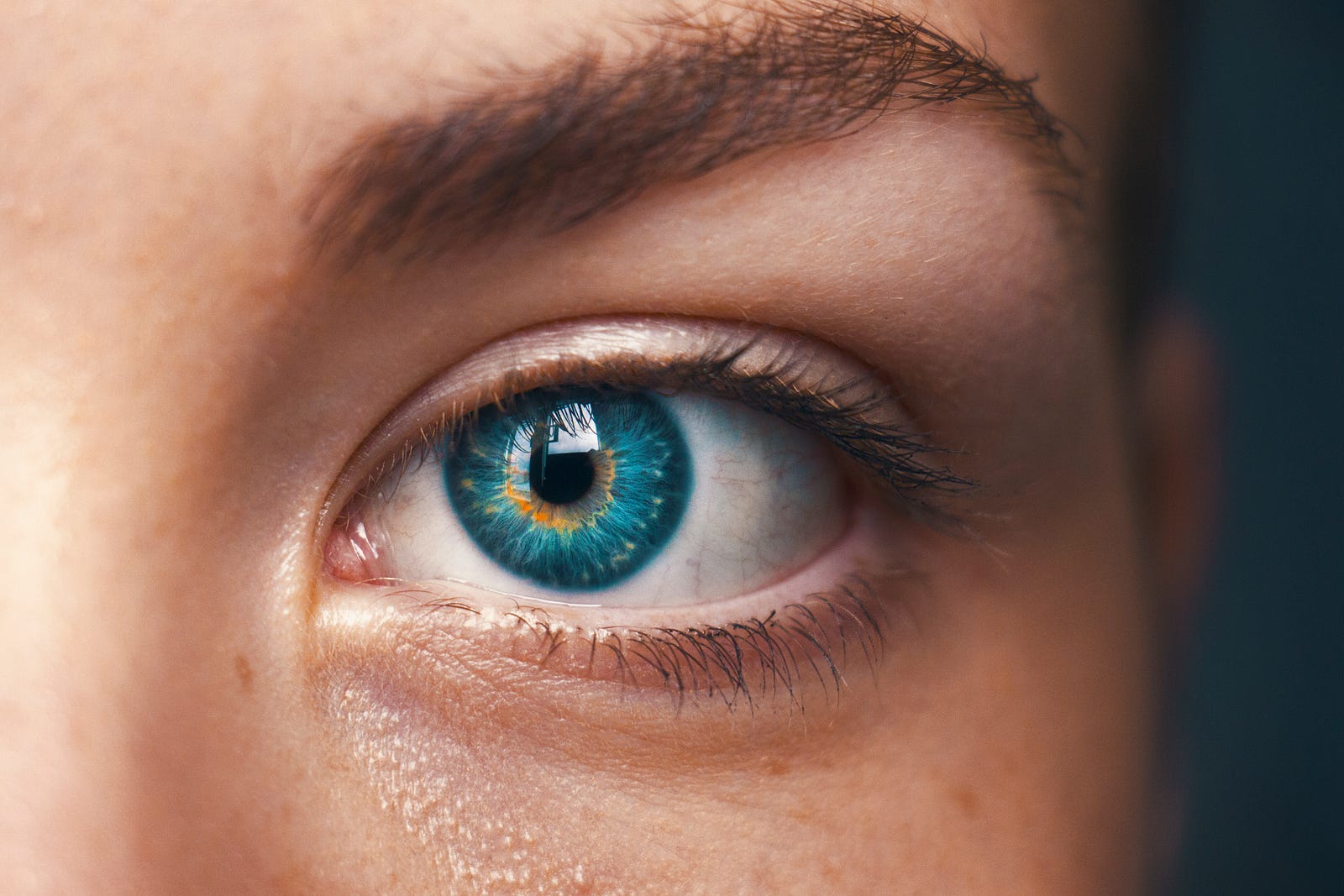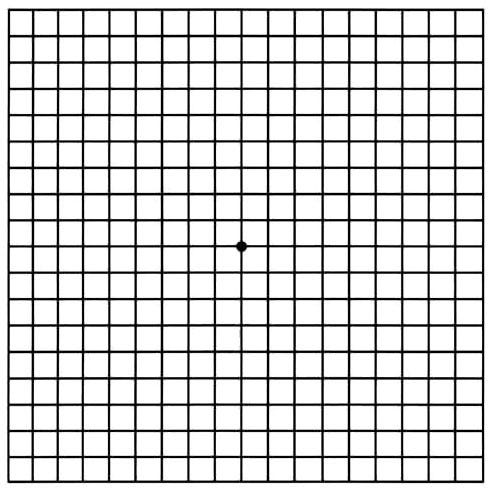STRESSORS OF DAILY LIFE (INCLUDING OBESITY) can change the immune system and harm an aging eye. A new Canadian study sheds light on a potential molecular reason that a blinding eye disease (age-related macular degeneration) occurs. Today we explore age-related macular degeneration basics before turning to the new study results showing how obesity can influence eye health. We’ll end with how you can promote eye health.
“For she had eyes and chose me.”
― William Shakespeare, Othello
What is age-related macular degeneration?
Age-related macular degeneration (AMD) is the number one cause of severe visual loss for people 50 and older. It is a chronic eye disease that affects the macula, the retina part responsible for sharp, central vision.


The disease usually affects people over 50, although it can occur earlier in some cases. There are two types of AMD:
- Dry (atrophic) age-related macular degeneration is the more common type of AMD, representing 80 to 90 percent of cases. In dry AMD, the light-sensitive cells in the macula slowly break down, causing a gradual loss of central vision.
- Wet age-related macular degeneration is not as common but is more worrisome. In wet AMD, abnormal blood vessels grow underneath the retina and leak fluid, which can cause rapid and severe damage to the macula.
Early on, AMD may have no symptoms, so people may not suspect they have it. In more advanced stages, individuals lose their ability to drive, see faces, and read smaller print.

Age-related macular degeneration risk factors include the following:
- Age
- Family history
- Smoking
- High blood pressure
- High cholesterol
- Obesity.
Unfortunately, AMD has no cure, but treatments can slow its progression and preserve vision. Management tools include medications, laser therapy, and photodynamic therapy. It is important to see an eye doctor regularly for the early detection and management of AMD.
Symptoms of macular degeneration
Dry macular degeneration symptoms typically come on gradually and without pain. They may include:
- Visual distortions (for example, straight lines seeming bent).
- Diminished central vision in one or both eyes.
- The need for brighter light when doing close-up work or reading.
- Increasing challenges adapting to low light levels, such as entering a dimly lit restaurant or theater.
- Increased blurriness of printed words.
- Challenges recognizing faces.
- A well-defined blurry spot or a blind spot in your visual field.
Dry AMD can affect one or both of your eyes. If only a single eye is affected, you may not notice visual changes — your good eye may compensate for the affected eye. AMD does not affect side vision, so it doesn’t lead to total blindness.
Dry macular degeneration can progress to wet macular degeneration when blood vessels grow and leak under the retina. The dry type is more common and usually progresses slowly over the years. The wet type has a higher chance of causing a relatively sudden change in vision resulting in serious vision loss.
Obesity and eye health
Researchers wanted to know why some individuals with a genetic predisposition develop age-related macular degeneration while others are spared.
The eye of an individual with AMD has an immune system that is not appropriately regulated and becomes aggressive. Normally, immune cells maintain eye health, but pathogens such as viruses or bacteria can nudge immune cells off course.
Moreover, immune cells may be activated by body stressors such as obesity. Being overweight is the second leading non-inherited risk factor for developing AMD, topped only by smoking.
For the new study, researchers used obesity as a model to exaggerate the body’s life stressors. Here are their findings:
Transient obesity (or a history of it) causes persistent DNA architecture changes within immune cells, making them more susceptible to producing inflammatory molecules.
Here is the take of Dr. Masayuki Hata, one of the study authors: “Our findings provide important information about the biology of the immune cells that cause AMD and will allow for the development of more tailored treatments in the future.”
The scientists hope their discovery will lead others to widen their interest beyond obesity-related diseases to other diseases characterized by increased neuroinflammation, including multiple sclerosis and Alzheimer’s disease.

My take — Obesity and eye health
While mutations in susceptibility genes increase the risk of developing age-related macular degeneration, they do not cause it. There is, therefore, a need to understand better how other environmental and lifestyle factors contribute to AMD development.
Please see an eye health professional if you lose the ability to see fine detail or have other changes (such as blind spots or distortion) in your central vision. Such findings may be the first symptoms of macular degeneration, especially if you are over 60.
Finally, you may be able to lower your risk of AMD (or slow AMD-related vision loss) by making some healthy choices, including the following:
- Avoid smoking.
- Get regular physical activity.
- Maintain healthy cholesterol levels and blood pressure.
- Eat healthy foods, including fish and leafy green vegetables. These foods have antioxidant vitamins that can reduce your risk of developing AMD. Include fish in your diet. Omega-3 fatty acids contained within fish might reduce your risk of macular degeneration. Nuts (for instance, walnuts) also contain omega-3 fatty acids.
Want to test yourself for AMD? Johns Hopkins Medicine (USA) offers the following way to do so:
Amsler Grid
To use the Amsler grid, follow these steps:
- Wearing any glasses you typically use for reading, in good light, hold the grid 12 to 15 inches away from your face.
- Cover one eye.
- Please focus on the center dot with your uncovered eye and focus on it.
- While looking at the center dot, check your side vision to see if all grid lines are straight or if any lines or areas appear wavy, blurry, dark, or blank.
- Repeat the same steps with the other eye.
Contact your eye doctor immediately if you notice any regions of the grid that appear darker, wavy, blank, or blurry.

One more thing for those with AMD — A new research approach to treating the condition:
NIH launches first U.S. clinical trial of patient-derived stem cell therapy to replace and repair…
Researchers at the National Eye Institute (NEI) are launching a clinical trial to test the safety of a novel…www.nei.nih.gov
The information I provided in this blog is for educational purposes only and does not substitute for professional medical advice. Please consult a medical professional or healthcare provider for medical advice, diagnoses, or treatment. I am not liable for risks or issues associated with using or acting upon the information in this blog.
Thank you for reading “Obesity and Eye Health” and exploring age-related macular degeneration. Please consider signing up to follow this blog. Thank you.




